A conversation with Orchestra Nazionale Della Luna
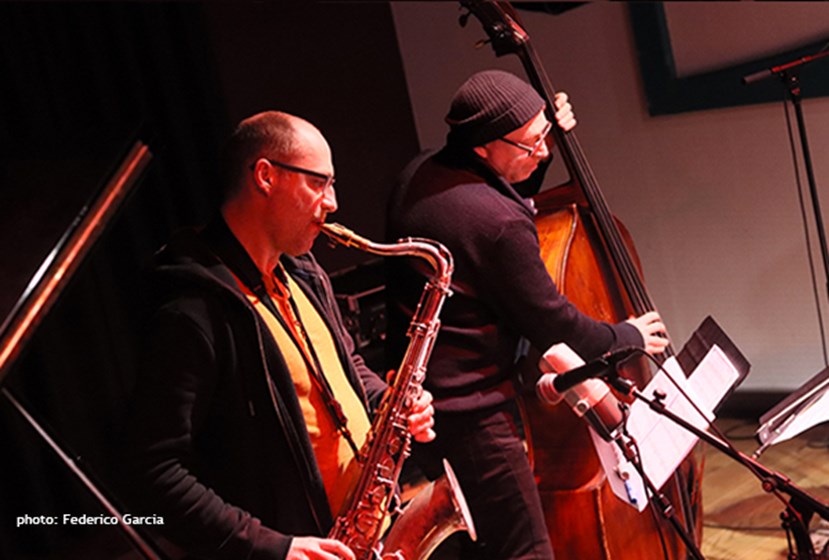
After two silent and quiet years all over the globe the international quartet Orchestra Nazionale Della Luna offered a mesmerising concert at Werkplaats Walter in Brussels. I had the chance to listen to these awesome musicians: Finnish pianist, moogist and composer Kari Ikonen, Belgian saxophonist, flutist and composer Manuel Hermia, Belgian drummer Teun Verbruggen, and Sebastien Boisseau, the French double bassist.
I spoke with Kari, Manuel and Sebastian for Jazz'halo moments before their performance.
You are playing together for seven years already. Both of you Kari Ikonen and Manuel Hermia, met around 12 years ago at a festival. I don't remember the name of the festival.
Kari Ikonen : Euro-Med in Budapest.
What were you playing ? Kari, you were playing piano, moog and who else was in the band, do you remember ?
Kari Ikonen : There was a very good drummer from Israel, a bass player from Serbia, I think. Yes. And a Portuguese guitar player, a guy playing Portuguese guitar and a cello player from Hungary and me.
Manuel Hermia: I was playing with Marcin Oleś from Poland on the bass. There was a young drummer from Serbia. There was a friend from Israel on piano, Amri Mark. And I actually don't recall who was the fifth one.
What instrument were you playing, Manuel ?
Manuel Hermia: Saxophone
And the Bansuri or the Flute ?
Manuel Hermia: No, I don't think I came with the Bansuri at the time. I'm not sure.
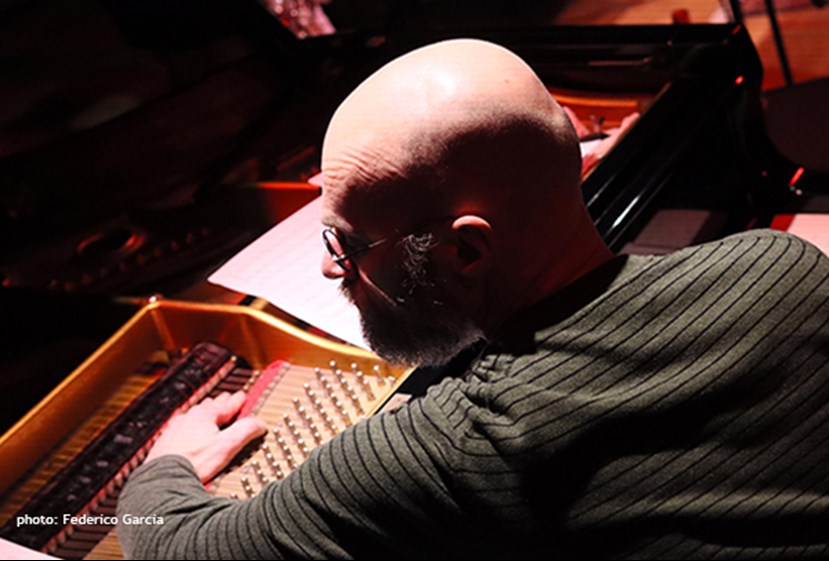
With Orchestra Nazionale Della Luna you have three recordings. I know “There is still life on Earth”, which is fantastic. The music is a mix of different musical approaches with a solid jazz base. But you mix music from the Middle East and some Indian music (ragas) as well. And obviously you also visit the maqams which you both love...
Kari, with the moog and your previous projects in Finland, you have kind of a 70 's approach with a psychedelic touch, and that's fantastic. How would you describe the main approach you have with your music ?
Kari Ikonen : I think we play very strict, mainstream, traditional jazz from the moon.
Manuel Hermia: One of the things we try to do with this band is, as you already mentioned, use the different influences on our musical language. We are using some stuff coming from basic mainstream jazz. We all enjoy free improvisation a lot. There are some influences, as you say, from East and Middle East and we use electronic tools. And after all we don’t want to choose. So it's about finding a balance between the different influences.
Kari Ikonen : Just play music and write compositions and see how we organically find a common way to approach them, like not trying to go to any certain style or genre, but we just play music with these four musicians who are openminded and compose.
Manuel Hermia: And something that happened with the forms at the beginning, we didn't have it immediately, but the more we played, we realized that we like to change the structures. So once we are familiar with the tunes, it's not like we always begin with this part and it can be whatever happens.
Kari Ikonen : Sometimes we talked about that. We change something.
Manuel Hermia: That's nice. Something that really happened without even speaking about it.
Kari Ikonen : Usually it happens during the concert.
Manuel Hermia: More and more freedom with the forms too.
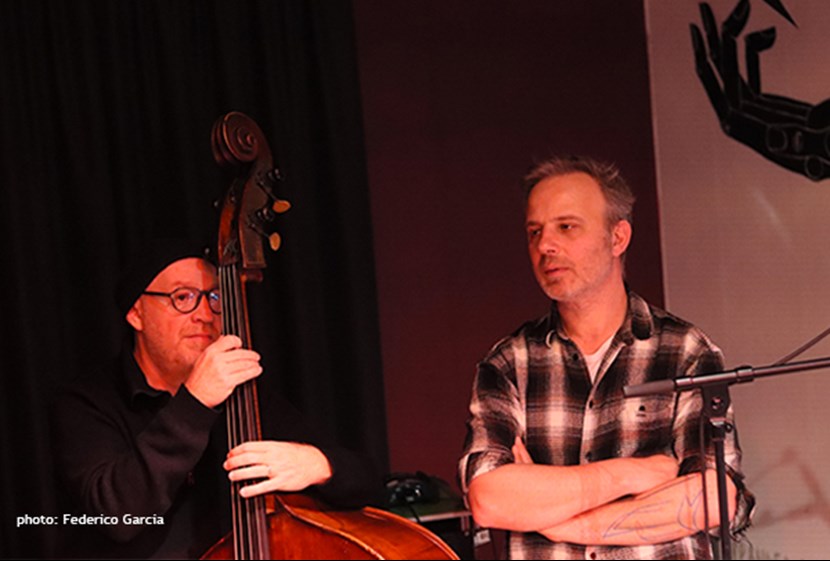
I believe the ones composing are basically you Manuel, Kari and Sebastien and Teun participates in the arrangements; so it's the four of you doing the arrangements, because of this solid background you have as musicians…
Manuel Hermia: It's totally collective. It's a band.
You were all born in Europe, and somehow you are very close. One thing that really unites you is your common language, music. But still, you have a different childhood, different language, different ways of approaching life. How were your first incursions into this creative ‘lunar approach’ you have with your music ? As a band project, how do you see your music ? Where does the name Orchestra Nazionale Della Luna come from ?
Manuel Hermia: I understand your question, but I'm not sure it has links with our different backgrounds and origins. I really think that what ties us, is the common background and the will to have a ludic approach and to be very open with music.
We already were discussing that it's very precious for us to have one of those bands, we will not be the only ones, of course, but whoever does whatever, nobody refuses it. That's something we find very positive, when we play, we share that, it's very precious. It's like a good lover…
Sure. You have to have a very solid relationship…
Manuel Hermia: Indeed. There's a lot of trust in the music,. And that's it.
But there is also the rapport among you, the great communication and empathy. Because, when there’s no chemistry, even though you are an amazing saxophonist and a unique pianist and double bassist, it simply won’t work…
Kari Ikonen : I think in this group the communication on stage works exceptionally well.
Do you improvise despite you have everything on paper, on the scores ?
Kari Ikonen : We don't have that much on paper. It's mostly improvised. Of course some things are written but the way we bring it on stage is quite different on every gig we do. During a tour, we play like four gigs in a Row.
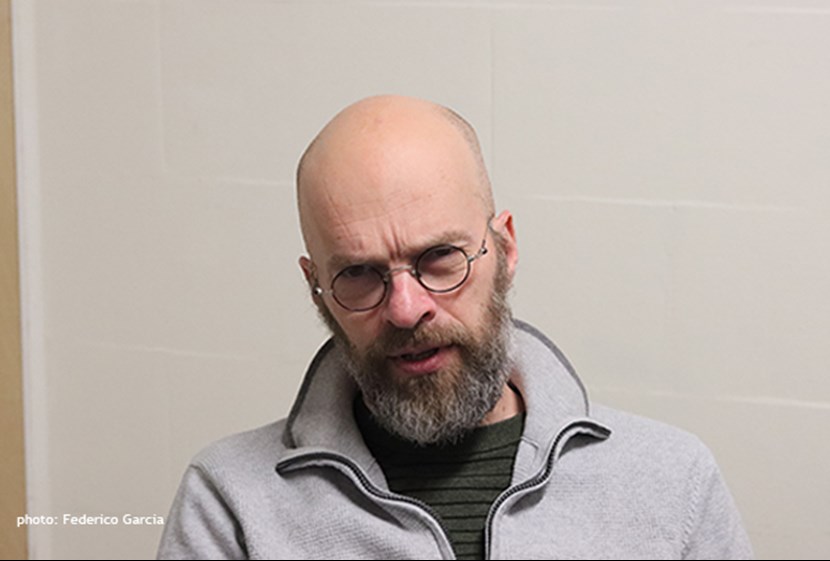
So, it's a dialogue that evolves every time you play that music...
Kari Ikonen : Yes, I think the communication in this band is exceptional. Because we trust each other and we listen to each other. Everyone wants to take risks and see what's happening in the music. If I do this and then I do that and then what?
Manuel Hermia: And then a lot of surprises. Very nice.
Kari Ikonen : Sebastien does something totally different than what we agreed or what we played on the other gig and then someone reacts to that immediately and suddenly everyone goes in that direction.
Manuel Hermia: And as we say, the whole structure of a tune can be totally different from one evening to another. It's a lot of fun.
Kari Ikonen : If you take a space shuttle from the Moon to Jupiter and then, suddenly in a millisecond, the direction changes totally like 180 degrees and everyone is going there.
Manuel Hermia: It's fun.
Sebastien Boisseau: For me it's also totally rooted in the jazz philosophy. And I really think it's a matter of philosophy why this music is a bit different. It's not better, but the way it works, it's a bit different. Every gig is totally different from each other because of this interplay between the musicians, which is really in the centre of the way we play this jazz, which is not often the case. Today it's less (I would say for a part of this industry of music), it's less and less based on the interplay. But for this band and for many others, it's still rooted on this question to be able to react to any kind of information, and any new information can bring something totally unexpected. And I think that's certainly what is important in our meeting. We love what is unexpected. And we work quite hard to be able to react to what is unexpected.
Manuel Hermia: When people talk about jazz, they emphasize individuality, which is somehow nowadays a way to understand music. But I think that type of jazz, where, as Sebastien said, there's a lot of interplay, it's not the individuals that are so important. It's really the type of relationship they share because you can replace a good musician with another very good musician and have a very shitty interplay or relationship. It's the relationship that is precious more than the individuals. And I think that's very important, because that's what makes a band.
Who had the idea for the name of the band and why ?
Manuel Hermia: A Finnish guy. We have to thank him (Kari) because when he said that, I remember my first thought was “now that you had that idea. It's impossible to say no, it's a great idea”
Kari Ikonen : Indeed, I do remember the moment we had some ideas about the name of the band. And that was the good one.
Manuel Hermia: It just came to your mind.
Kari Ikonen : Orchestra Nazionale Della Luna!
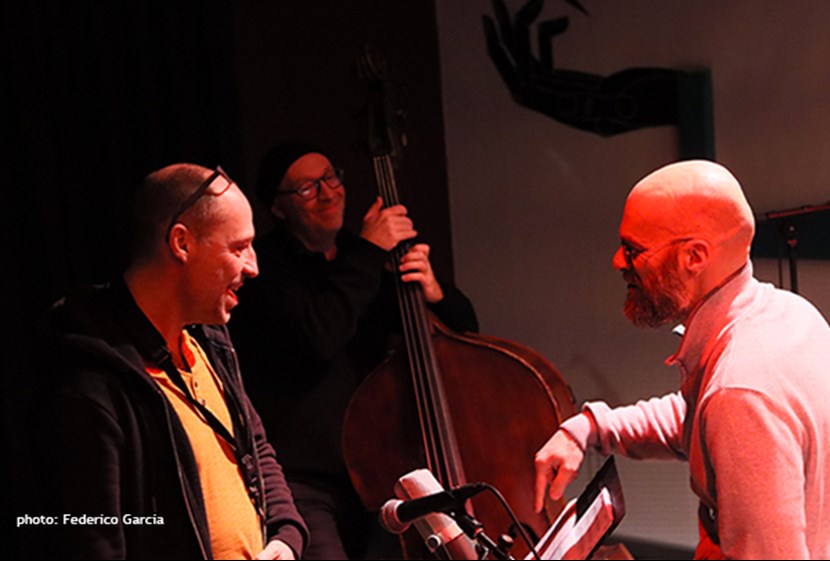
Why the Italian words and why the moon ?
Manuel Hermia: I think it's kind of “Fellinian”. It gives a “Fellinian” vibe, this kind of absurd world that makes it more real somehow.
Kari Ikonen : And also it's a music language. Classical music. The musical terms are usually in Italian, the scores and...
So far you have released two albums and you are about to launch the third one. When will that one be out ?
Kari Ikonen : March 2024.
Do you already have an idea for the name of the album ?
Manuel Hermia: No, not yet.
Are you already working on the compositions ?
Manuel Hermia: You will hear them tonight. Yes.
Kari Ikonen : Most of them, Yeah.
How many tracks do you have for this new album ?
Kari Ikonen : I don't know. Now we have seven new pieces that we will play tonight. But on the album, we probably will have two more.
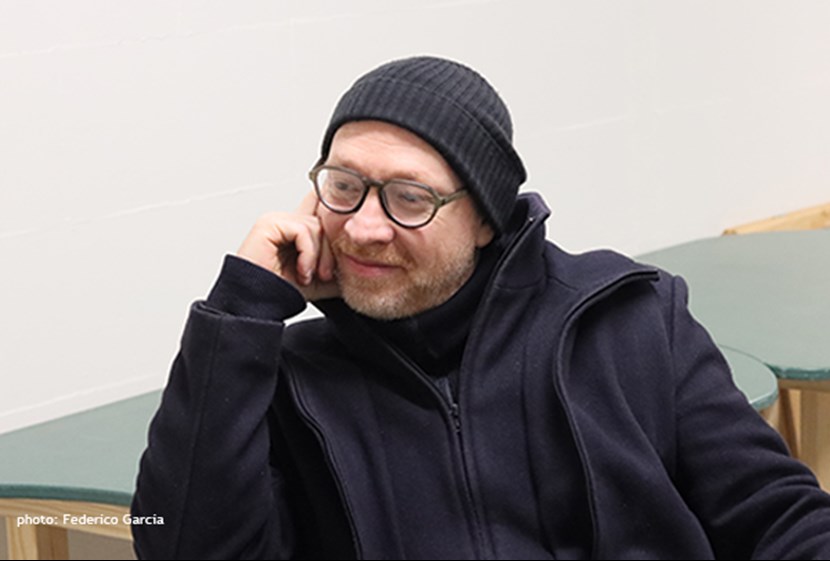
Musically there's a difference between the first album and the second album. It's obvious, it's an evolution. Do you have a kind of preference at the moment for one of them ?
Manuel Hermia: Yes, I'm not sure if it's a preference. It's more like when you have kids, would you prefer your kids at two years, ten years or 20 years ?
It's a process and about having a band, because there is a lot of punctual projects now in jazz that don't last too much. And when you have a real adventure with a band, it feels as being transported in this process of time. So regarding preference, we don't ask ourselves that question. We are in the process.
Sebastien Boisseau: I think there is an obvious evolution between the two recordings. Also because our first meeting was for the first album. I never played with Teun before as a rhythm section, so it was a total discovery for both of us. And I think that it really felt good from the first moments on. But for me it's even stronger on the second album, because of the compositions, they have a more complex rhythm and there are more possible rhythmical options because of the way we compose on the second album. So it was also very important to have this connection.
Kari Ikonen : Yes. But on the other hand the first album has its freshness.
Manuel Hermia: It has its freshness. But I think that's the common thing, something that we always have in mind is to keep the freshness.
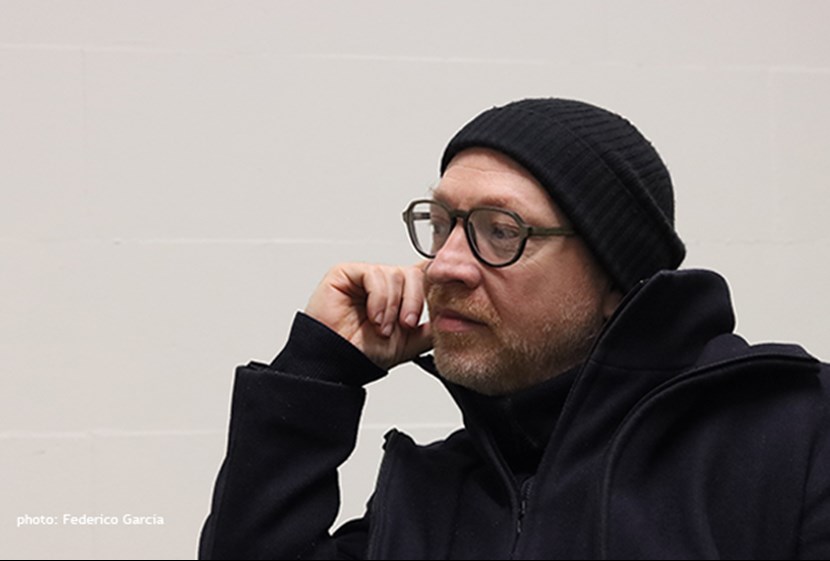
In your case Kari you are a couple thousand kilometres away, and all of you have so many different musical projects. But when you play together, do you rehearse first or do you just communicate during the creative process when you compose. How does it happen ? Do you first compose on your own (mostly the two of you Kari and Manuel) and then exchange ideas, notes ?
Kari Ikonen : For example, now we rehearsed here for three days or actually two days with me because I was ill. But we rehearsed the new music here, at Werkplaats Walter. Also when we have a tour, if it's possible we start one day earlier with a rehearsal; if it's not possible we rehearse during the soundcheck. But it all depends of the time after the last concert we did.
Manuel Hermia: If we played 2 or 3 months ago we don't need to rehearse.
Kari Ikonen : Exactly. But if it's a longer period, if there's like a half a year break or if there's new music, then we need to rehearse. And sometimes a long soundcheck is enough to learn one new piece. If there is a possibility to play for two hours, then it might be enough. But usually it's nice to organize the tours so we can start with a proper rehearsal and learn the old stuff again and then learn some new music as well.
Manuel Hermia: Whatever composition we bring, Kari and I treat it with the band. Now we are really writing for the band. Everybody is open for each one’s propositions. it's really a creative group treatment and that's part of the process too.
Kari Ikonen : I think that is the difference between the second and the new album. Composition wise, I think that now we give even more freedom to the band, to all of us to create inside the compositions, at least that's my opinion, to write less and with less exact arrangements. Because even for the last album, I think there was something that was pretty arranged somehow, even if it was written for the band.
Manuel Hermia: It's more conceptual. There's a lot of freedom inside the composition, and for sure I don't know in advance how it will sound like exactly. Then at the next concert it will sound very, very different. There's no way that it would be the same version twice. It's impossible.
Kari Ikonen : Yes, it's impossible because it's...
Manuel Hermia: It's Italy.
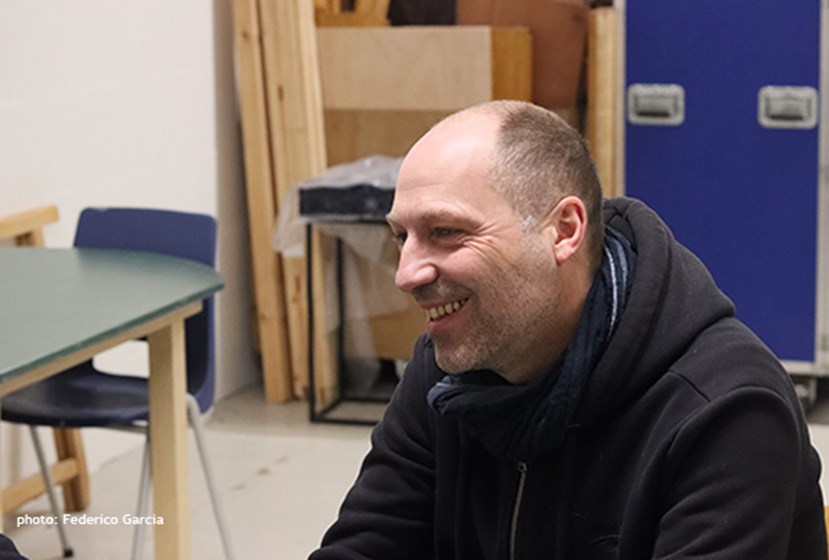
Were you playing concerts with the music you compose for the concerts and then recorded the album ?
Manuel Hermia: Now, we usually write a little bit and we are recording pretty fast. What we tried to do before the first album was that some of the tunes were kind of written a little bit earlier. We were still playing a lot of concerts, so we had the time to experiment with the tunes. After the album, every time we play, there’s still an evolution. You can feel it with the live version of the first CD. The versions are very different from the first recordings because in the meantime, a lot happened.
Where did you record the live album ?
Kari Ikonen : It was recorded in Avignon.
What’s the process now ? Will it be different ? Because, for instance today, you will launch the next album already before it’s available...
Manuel Hermia: There is confidence among us. Knowing, learning the material I have now. Everybody has his part to work on, but then it's a lot of just being together and have trust in each other.
I believe the recording will be made in Budapest at the recording studio there…
Manuel Hermia: We will have the time there, during another residence of three days to try out and define more things.
Kari Ikonen : Even just before that recording we play in Belgium at the Gaume Jazz Festival.
Manuel Hermia: That will be a mix of old tunes and new tunes, probably.
Kari Ikonen : But we will do some new stuff there as well.
If I am correct, you started giving concerts since 2015 and then mostly you have been performing in Germany, Finland and also in Budapest…
Kari Ikonen : France and Holland, and one in Italy.
Did you notice a kind of a different European culture and love for jazz in all these countries where you have played ?
Manuel Hermia: We are European. But the main goal is not our origin, it's the music we do and what we share in that respect. Somehow every label is always a little bit limited. Because it's nasty, and you always fall in genre. Labels.
Kari Ikonen : Exactly.
In regards to gigs here and there, different countries, languages, cultures, do you notice a difference on the perception/reception of your music ?
Manuel Hermia: Indeed, but I'm not sure it's national. Every night is different, even in the same city. You can play in three different places and the reactions are diverse. It depends on the audience. And I'm not sure it's the perception. It depends so much on the culture of the people.
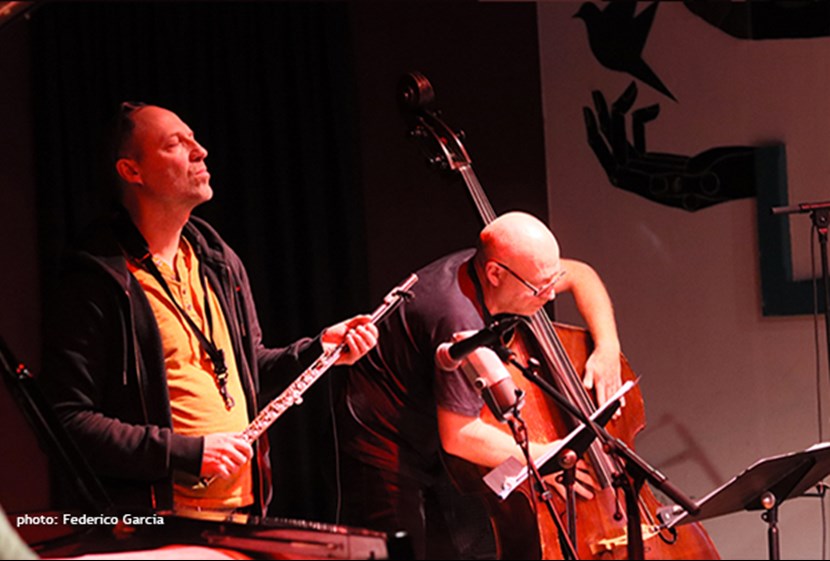
Currently we are living a very different planet Earth, a different humankind since, let's say the whole “thing” started changing all in the period 2019, 2020 until even 2021, the most dystopian situation we've ever had…
Manuel Hermia: We had a premonition title. the title of the album: “There's still live on Earth” before the COVID crisis, because it was targeted to ecological problems that we were discussing together. But that was before Corona. We didn't know that. And actually the album came out, we did the promotion of the CD. Covid was all over Europe already, so this was not expected.
Kari Ikonen : Even the album’s cover looks like the Coronavirus.
How has it been for you musically speaking, especially these post-Corona times and how these Corona times, have inspired you individually ?
Kari Ikonen : For me personally, this COVID period was terrible, but it wasn't a catastrophe. And there was a lot of good things as well. First of all, I didn't have the economic pressure because I was in the middle of a five year grant, an artistic grant. The COVID period fell entirely in this five year period. But of course it was super frustrating.
For example, our release tour with this band was postponed three times and it was really frustrating, because you put so much energy and so much time in it to book a tour, the concerts, to plan and to practice. And then they have to cancel. It's terrible. And then you book new dates and they got cancelled to, then they booked the new dates again and....
Well that's not funny. But I have to say that for me personally I was very lucky because those little periods during the pandemic I had planned solo concerts and most of them happened because then it still was possible to play for a limited audience in small places. As I played solo, I could play in a venue for 30 people sitting far from each other. So I could still work and besides that, I had plenty of time to develop my Maqiano (TM) device, this micro tuning system. Without COVID, it wouldn't be ready yet.
Manuel Hermia: Yes, somehow it helped you.
Kari Ikonen : It helped because I needed a lot of time to do that and during that period it was kind of depressing. So I didn't find motivation to compose, for example.
Manuel Hermia: Because it was not inspiring.
Kari Ikonen : It was not inspiring. I didn't know when I could perform, when I could play these compositions and with which band and so on...
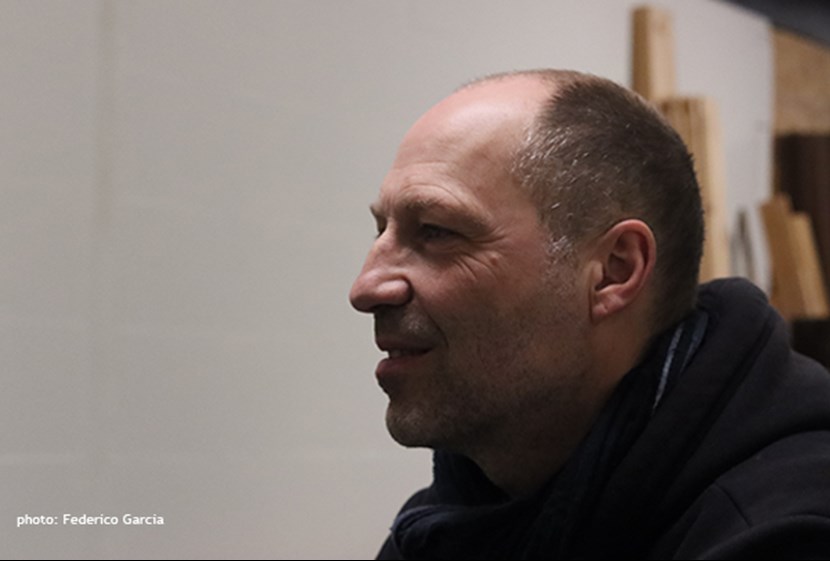
Manuel Hermia: These were very paradoxical times. At the beginning I felt, of course, the fear, like everyone, because there was a part of social fear that was instilled by the media and nobody knew what to think. But considering just the time, the two first months felt like a relief, because on my part the five or six last years of my life have been more busy than the rest of my life before. I'm a father. I'm a teacher. I used to have a lot of free time and those last years were like very full.
And suddenly I was there. And I woke up in the morning with my agenda empty, so I had time to look at my garden and drink a coffee, play with my little girl and just totally be there. And that was freaking great. I have to be honest with this.
So that really was like “what the heck is going on in this world?” Of course there was the dark side, but there was some good in it, and like Kari had the Maqiano (TM) at that moment, I don't exactly remember when it started, but I was very busy with the theoretical thing called “rajazz” that I put on. Also I began to take the time to put it on paper, on files, and to begin to work with this took me a few hundreds of hours that I would never had without COVID. I also practiced some clarinet, I play a little bit clarinet sometimes. I never had the time to practice before. Also I felt the lack of inspiration for writing. It's strange, huh? It's... You don't know why…
Kari Ikonen : I don't know why.
Manuel Hermia: Because I believe that afterwards, we say that as human beings without the social context, we don't really exist. I think also compositions have an emotional part and there’s the need for interaction with other people. Even if you compose alone, it is nourished by all this interaction you have with others.
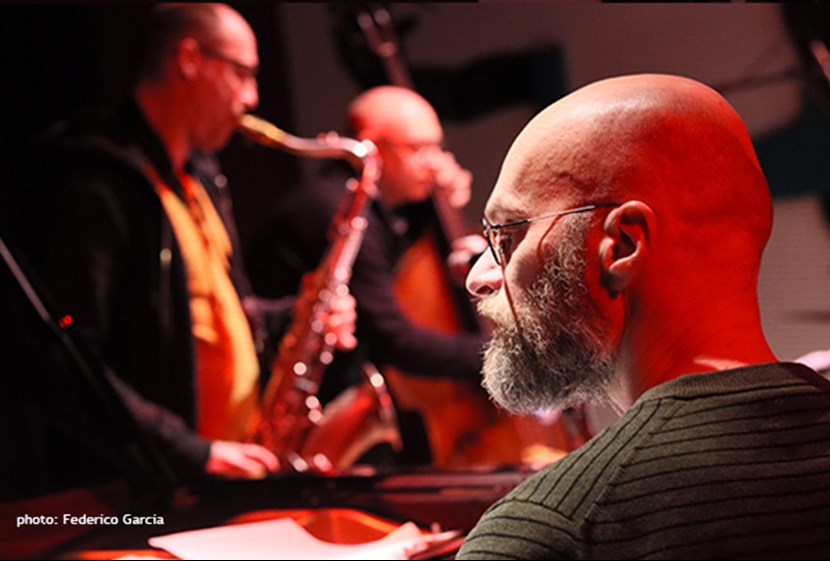
And also the lack of an audience, right ?
Manuel Hermia: Yes. I have to say that I'm really not a depressed person. Something dark was there anyway. I was really missing the energy of those people in one room. I know I always need a part of loneliness in my life, but nevertheless I was missing the social life at that moment. Also I call it the psycho emotional effect of playing music with friends. I felt it was totally part of my chemical balance. I was feeling like shit at that moment. It's really just like, when you don't have an intercourse for a few years, it's like something is really ... I'm sorry , but it's, just very clear. It's like you’re really missing something here. I find myself in a state where chemically, in my emotions and brain, I'm not in balance anymore. And that was it. I played a few gigs and I was back.
Indeed, it has changed us all. We would like to forget this “thing” though. But we won't…
Kari Ikonen : We won't and also the COVID, it was just a tiny detail compared to the stuff that the future will bring to us.
Manuel Hermia: Yes, that's the thing with the title of the second album... There's still Life on Earth.
What would be your message for jazz lovers that are going to read this interview ?
Manuel Hermia: Buy your new house.
Kari Ikonen : We will reveal the answer in the cover of our next album.
Manuel Hermia: Everybody puts this small brick in the wall... Music is our small brick in the engagements in the big world.
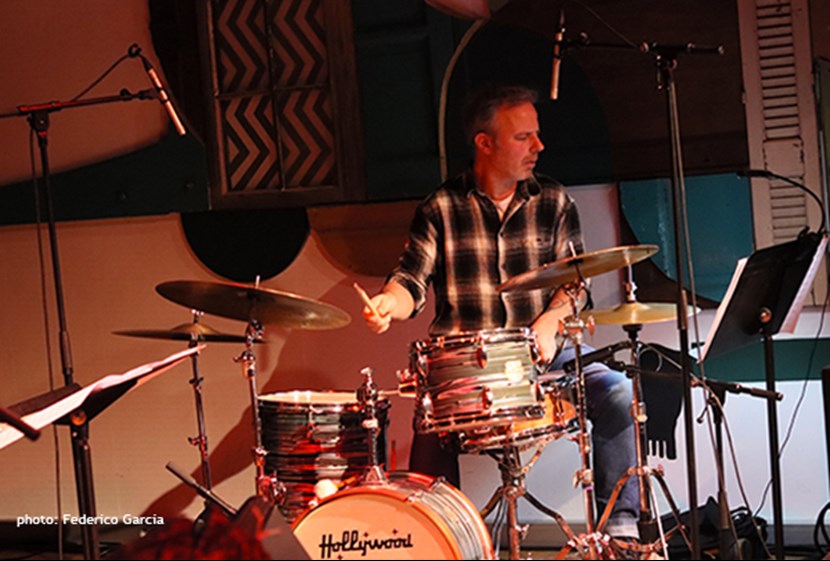
Thank you very much for this conversation guys, I wish you all the best with Orchestra Nazionale Della Luna and lots of music.
Text and photos © Federico Garcia
A collaboration with Jueves de Jazz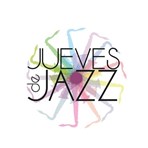
Other
In case you LIKE us, please click here:

Foto © Leentje Arnouts
"WAGON JAZZ"
cycle d’interviews réalisées
par Georges Tonla Briquet

our partners:



Hotel-Brasserie
Markt 2 - 8820 TORHOUT

Silvère Mansis
(10.9.1944 - 22.4.2018)
foto © Dirck Brysse

Rik Bevernage
(19.4.1954 - 6.3.2018)
foto © Stefe Jiroflée
Philippe Schoonbrood
(24.5.1957-30.5.2020)
foto © Dominique Houcmant

Claude Loxhay
(18/02/1947 – 02/11/2023)
foto © Marie Gilon

Pedro Soler
(08/06/1938 – 03/08/2024)
foto © Jacky Lepage
Special thanks to our photographers:
Petra Beckers
Ron Beenen
Annie Boedt
Klaas Boelen
Henning Bolte
Serge Braem
Cedric Craps
Luca A. d'Agostino
Christian Deblanc
Philippe De Cleen
Paul De Cloedt
Cindy De Kuyper
Koen Deleu
Ferdinand Dupuis-Panther
Anne Fishburn
Federico Garcia
Jeroen Goddemaer
Robert Hansenne
Serge Heimlich
Dominique Houcmant
Stefe Jiroflée
Herman Klaassen
Philippe Klein
Jos L. Knaepen
Tom Leentjes
Hugo Lefèvre
Jacky Lepage
Olivier Lestoquoit
Eric Malfait
Simas Martinonis
Nina Contini Melis
Anne Panther
France Paquay
Francesca Patella
Quentin Perot
Jean-Jacques Pussiau
Arnold Reyngoudt
Jean Schoubs
Willy Schuyten
Frank Tafuri
Jean-Pierre Tillaert
Tom Vanbesien
Jef Vandebroek
Geert Vandepoele
Guy Van de Poel
Cees van de Ven
Donata van de Ven
Harry van Kesteren
Geert Vanoverschelde
Roger Vantilt
Patrick Van Vlerken
Marie-Anne Ver Eecke
Karine Vergauwen
Frank Verlinden
Jan Vernieuwe
Anders Vranken
Didier Wagner
and to our writers:
Mischa Andriessen
Robin Arends
Marleen Arnouts
Werner Barth
José Bedeur
Henning Bolte
Erik Carrette
Danny De Bock
Denis Desassis
Pierre Dulieu
Ferdinand Dupuis-Panther
Federico Garcia
Paul Godderis
Stephen Godsall
Jean-Pierre Goffin
Claudy Jalet
Chris Joris
Bernard Lefèvre
Mathilde Löffler
Claude Loxhay
Ieva Pakalniškytė
Anne Panther
Etienne Payen
Quentin Perot
Jacques Prouvost
Renato Sclaunich
Yves « JB » Tassin
Herman te Loo
Eric Therer
Georges Tonla Briquet
Henri Vandenberghe
Peter Van De Vijvere
Iwein Van Malderen
Jan Van Stichel
Olivier Verhelst



